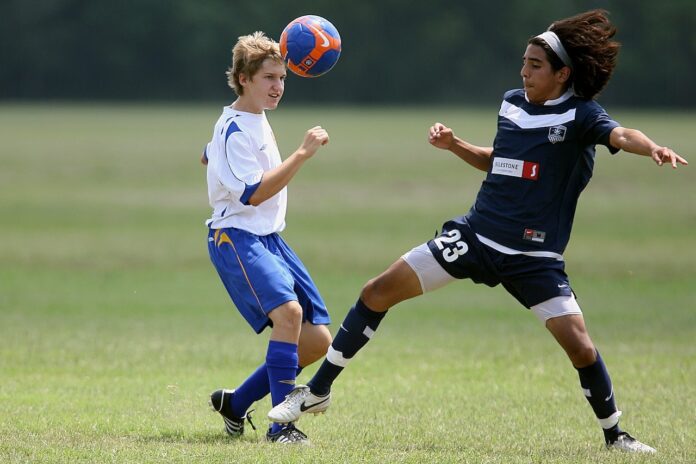
- More than half of parents fret over their children returning safely from school
- Around half of parents say they and their offspring have been victims of anti-social behaviour
- Nine in ten parents say local sports and youth clubs are central to reducing anti-social behaviour and youth crime
- New Centre for Social Justice inquiry chaired by Lord Nash backed by sports stars Jamie Redknapp, Courtney Lawes and Tim Henman
Parents are petrified that their children will be victims of crime and anti-social behaviour and believe that local sports clubs should take the lead in keeping young people out of trouble.
This is the stark finding of a new poll commissioned by a leading Westminster think-tank.
It reveals that more than half of parents are concerned about their children returning home safely from school and about anti-social behaviour in the vicinity of their schools or colleges. The figures are even higher among poorer families and those living in London or other urban areas.
The survey suggests levels of anti-social behaviour are widely under-reported in official figures. Around 50 per cent of parents said that they themselves been the targets of youth anti-social behaviour and that their children have also been victims.
The survey of 1,001 parents by Opinium has prompted the Centre for Social Justice (CSJ) to launch a major inquiry into how sport and physical activity can transform the lives of disaffected youngsters and restore order on the streets.
The inquiry, announced on the eve of the World Cup starting next weekend and in partnership with the Nick Maughan Foundation (NMF), is being backed by England rugby captain Courtney Lawes and other sports stars. The inquiry is being chaired by former Schools Minister Lord Nash.
Parents are in little doubt that sport can help turn the tide.
Nine in ten parents surveyed said that local clubs offering extra-curricular sport and physical activities are important ways to reduce youth crime and anti-social behaviour – and crucially, to prevent it from happening in the first place.
But barely a third think young people have enough opportunities – such as sports clubs – locally to keep them busy and out of trouble. Three in five do not think there are enough.
According to a report by the YMCA, there was a 70 per cent real-term decline in local authority expenditure on youth services between 2010 and 2019. Since 2010, more than 4,500 youth work jobs have been cut and 760 youth centres have been closed.
Jamie Redknapp, former England and Liverpool footballer, said: “I’ve seen first hand the power of sport in giving kids a sense of purpose and belonging, a reason to get up in the morning and stay out of trouble at night. Now more than ever we need more positive things for our children to do.”
Courtney Lawes, England international rugby union player, said: “For poor kids growing up in rough areas of the inner cities, sport can literally be a lifeline. I know of many young people rescued from the streets by finding a constructive and enjoyable outlet for their energies and getting involved in sports like rugby, football, and boxing. Teenagers need structure in their lives and a safe space to let off steam. A rugby pitch, football field or a boxing ring is the perfect place to do it. And the presence of mature coaches can restore order and purpose to their lives.”
Tim Henman, former majors tennis player, said: “I know from the work with my own Foundation how sport can transform the lives of vulnerable and disadvantaged young people. It can improve mental as well as physical health as well as help to keep kids out of trouble.”
The CSJ’s move comes after the new Prime Minister said he wanted to make ‘safer streets’ a personal priority. But it is not yet clear whether Rishi Sunak’s pledge means he will stick by the promise of his predecessor Liz Truss and carry out a review of anti-social behaviour.
Just one in five parents said they were confident in the Government’s plan to tackle the issue.
It comes against a background of consistently high rates of youth knife crime, which is up by almost a third since 2014 according to official figures from the Youth Justice Board. The poll finds that 51 per cent of parents feel their local area is less safe for a child to grow up in than five years ago. Only 14 per cent of parents believe the streets are safer now.
Just two years ago, the National Youth Agency reported that 60,000 youngsters aged 10-17 identify as a gang member or know a gang member who is a relative. Official figures showed that last year there were 50 homicides where the victim was a teenager (aged 13 to 19 years). In 70 per cent of these teen homicides, the method of killing was a knife or sharp instrument.
A recent study published by the British Medical Journal found that under-16s are at the highest risk of getting stabbed on their way home from school. “The period immediately after school accounts for a large proportion of [stabbing] incidents in children, and these predominantly occur close to home and school,” said the report led by Paul Vulliamy from the Centre for Trauma Sciences at Queen Mary University of London.
The CSJ argue that fewer opportunities for sport and physical activity is a “missed opportunity” to stop thousands of young people growing up to lead dangerous lives of crime. Last year there were around 41,000 offences among adults involving a knife or sharp instrument in England and Wales (excluding Greater Manchester Police Force), 27 per cent higher than in 2010/11.
Lord Nash, former Schools Minister, said: “Sport should be firmly embedded across all schools giving students the opportunity to explore a range of different sports. Forming the habit of taking exercise at an early age is so important for future health and teaches students about teamwork and self-discipline. But we must now go further – looking beyond the school gates – to expand the provision of youth sports more generally.”
Andy Cook, Chief Executive of the CSJ, said: “Sport is a secret weapon that can not only change youngsters’ lives for the better, but make our streets safer. I hope ministers follow this inquiry closely and unleash the power of sport and physical activity to improve the opportunities for a generation of young people.”
Nick Maughan, Founder of the NMF, said: “Knife crime and street violence are two of the biggest challenges facing young people across the UK today. The staggering results from the CSJ’s latest poll confirm this and highlight the clear need for action to support our young people, particularly post pandemic. Through my work with the Nick Maughan Foundation and our flagship programme, BoxWise, I’ve seen first-hand the transformative impact sport can have on the lives of young people. It’s clear that more needs to be done to provide all young people access to these kinds of opportunities, and to assure parents that there are resources available to keep their children safe. The potential of sport in providing this cannot be underestimated.”
All key poll findings: A landmark survey of 1,001 parents with children aged 10-17 conducted by Opinium for the CSJ found:
- Over half of parents (53%) are concerned about the safety of their child getting home from school
- Over half (56%) of parents are concerned about anti-social behaviour in the area around their child’s school or college. This rises to 60% of parents in low-income households and 67% of those in urban areas.
- Concerns about youth violence and antisocial behaviour were highest among parents in London, with almost 8 in 10 (77%) ‘very concerned’ or ‘quite concerned’.
- Young people living in low-income families are almost twice as likely to have been assaulted by another young person compared to more affluent households, according to their parents (21% compared to 11%)
- Over half (58%) of parents have experienced youth antisocial behaviour in their local area, with 44% experiencing it in the last 12 months.
- Almost half (45%) of parents report that their child or children have been victims of antisocial behaviour.
- Approximately half (51%) of parents believe that their area has become less safe for their children to grow up where they live now compared to five years ago. Only 14% think it has got safer, while three in ten (30%) think it has not changed.
- Meanwhile, only one in five parents have any confidence in the Government’s plans to tackle anti-social behaviour (21%)
- Nine in ten (89%) think local clubs offering extra-curricular sport and physical activities are important ways to reduce youth crime and anti-social behaviour. But barely a third (35%) think young people have enough opportunities – such as sports clubs – locally to keep them busy and out of trouble. Three in five (59%) do not think there are enough.
- Four five parents said cuts to youth centres have led to an increase in anti-social behaviour and youth crime.
- Nine in ten (89%) said ‘Government should invest more in youth infrastructure (clubs, sports facilities and activities) as part of its plan to tackle antisocial behaviour’
Help keep news FREE for our readers
Supporting your local community newspaper/online news outlet is crucial now more than ever. If you believe in independent journalism, then consider making a valuable contribution by making a one-time or monthly donation. We operate in rural areas where providing unbiased news can be challenging. Read More About Supporting The West Wales Chronicle























